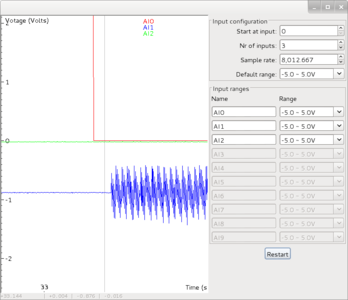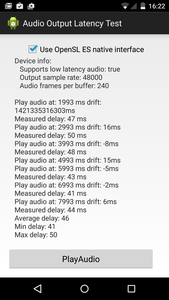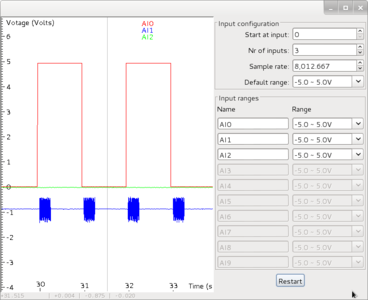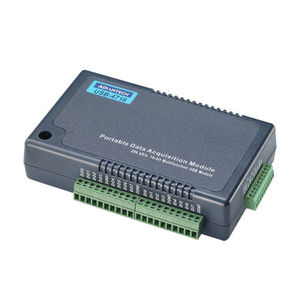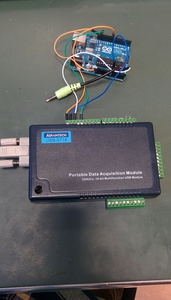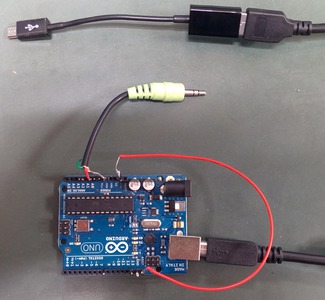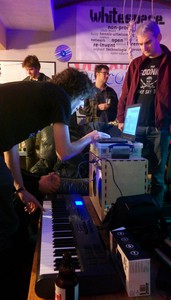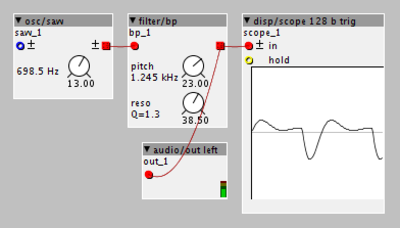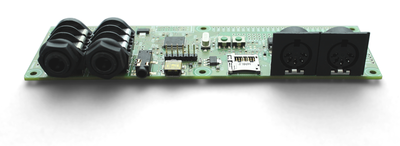~ Measuring Audio Output Latency on Android Lollipop using an Arduino
» By Joren on Thursday 15 January 2015 This post explains how to measure audio output latency on Android devices. To measure audio latency USB-OTG(On The Go) and an Arduino is used. In the process it documents audio output latency on an LG Nexus 5 device running the most recent version of Android, which currently is Lollipop (5.0).
This post explains how to measure audio output latency on Android devices. To measure audio latency USB-OTG(On The Go) and an Arduino is used. In the process it documents audio output latency on an LG Nexus 5 device running the most recent version of Android, which currently is Lollipop (5.0).
Audio latency is an important aspect of a system, especially if it is used for real-time sonification or for musical applications. Audio latency is the, preferably short, delay between audio entering a system and emerging from a system. Audio output latency is the time it takes between a signal (e.g. a button pressed) and when audio emerges. For sonification purposes audio output latency is more interesting than round-trip audio latency.
Android systems are often portable, generally available and relatively cheap. Android offers an attractive platform to develop sonifications or musical applications for. Unfortunately, audio latency on Android has not been a priority in the first versions. With Android 4.1 things started to change but due to hard- and software fragmentation it is still hard to find how much audio latency is expected. Even if the exact model (e.g. Nexus 5) and software version (stock Android 5.0) is known, exact numbers are, so it seems, nowhere to be found. For more information on the internal changes that make low latency audio on Android possible, watch the talk on High Performance Audio from the 2013 Google I/O conference. Also note the lack of exact latency numbers in that talk. It is a very enjoyable talk by two Google engineers going after the culprits of high latency in true Sherlock/dr. Watson style.
Since audio output latency is generally not documented and since it is an important factor to decide if Android is a viable platform for real-time sonification or musical applications it needs to be measured. One way of measuring audio output latency on Android is documented by the people of Google. Unfortunately, the approach is not easily reproducible since it needs a custom circuit board, an oscilloscope and there is no source code available. Below a reproducible way to measure audio output latency for Android is documented.
An Arduino, an Android device, an USB-OTG cable and a butchered mini-jack audio cable are needed together with the software provided here. Optionally, a data acquisition module can be used to visualize the signals. The measurement system works as follows:
- An Arduino sends a signal over USB. The time at which the signal is send is stored for later use.
- An Android device, connected to the Arduino via an USB-OTG-cable, receives the signal.
- The Android device responds as quickly as possible, with the lowest latency as possible, by emitting a sound.
- The sound is captured on an analog input port of the Arduino, via the mini-jack cable. The time the sound appears on the Arduino is stored.
- By comparing the time when the signal was send with the time when the sound arrived, the audio output latency is measured and reported.
The previous steps are repeated every second to gain insights into the variability of the measurements. To generate microsecond accurate timing interrupts are used on the Arduino. For visualisation, a digital pin is toggled every time the Arduino sends a signal. The Arduino sketch is attached to this post, as is the source code for the Android application. An already compiled APK is also available. With some luck - a recent Android version is needed, your device should support USB-OTG - it might work on your device.
Results
Using the OpenSL ES native interface on a Nexus 5 with Lollipop installed the USB input to audio output latency is on average about 48 milliseconds. There is some variability but it is usually within 15 milliseconds. For music applications this latency is not great but, depending on the application, acceptable. For expert drummers latency should be in the range of 20ms but for many sonification tasks, 50ms suffices. It is clear that Android will never be able to compete with purpose built hardware running a real time operating system like Axoloti (Audio roundtrip latency 2ms, usb-audio 1.6ms) but for a general purpose device the measured latency is significantly better than what I expected (around 100ms).
The non-native audio interface is a lot slower. I have measured an average latency of about 85ms and a much larger variability (25ms).
With this post I hope others will report the latency for their devices as well, so that buyers that are interested in a low-latency Android devices can make an informed decision.

